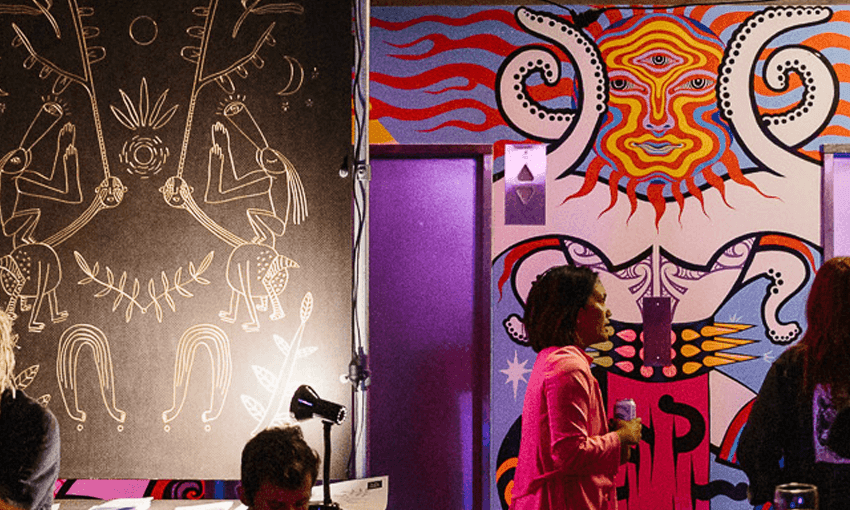Two/fiftyseven is a multi-purpose space hidden in the heart of Wellington that is paving a way for sustainable building and responsible landlording in Aotearoa and beyond.
By 2060 the world is predicted to double its entire building stock, which equates to building an entire New York City every 34 days, for 40 years straight. The carbon cost of that construction is mind-blowing given that the built environment is responsible for about 42% of annual global CO2 emissions.
It’s this kind of statistics-based evidence that informs the radical new approach to property behind two/fiftyseven, a space where people can work, meet, make, share, play, and take risks in a climate positive environment. At the heart of two/fiftyseven is an experiment in maximising space, minimising carbon, and edifying the communities that intersect with the project.
After only three years, the two/fiftyseven community has provided space for over 500 organisations, hosted nearly 1000 events and hui, and is on track to be used twice as much as some of the inner city office space around it, all while giving people a new reason to feel good about booking a space that is giving back. “We don’t need to double the size of our cities by building more, we can double the size of them by learning to share more, by being together – sharing is at the heart of a sustainable future we believe in at two/fiftyseven,” says founder Ash Holwell.
Holwell credits his time as a legal squatter in Rotterdam while working for one of the leading young industrial designers in the Netherlands as the genesis of his passion for dynamic built environments that save planet, people, and communities from a cut-throat, and exclusive, property market. “Your ability to use a building wasn’t based on owning it, it was based on your ability to use it, and in doing so squatting empowered local economies and communities with space.”
When Holwell came home from the Netherlands he immediately set about transforming spaces in his hometown of Whangārei, where his parents owned an empty warehouse space that was ripe for a fresh approach. “After seeing another way of looking at space, one based on sharing, I felt like it was my responsibility to use the empty space well,” he says.
Together with friends, Holwell’s work on a council-owned empty church turned local theatre and arts centre named oneonesix (that now attracts over 20,000 visitors a year), a community bike workshop that repaired and gave away over 300 bikes that would otherwise have gone to landfill, and Whakaora Kai which last year distributed over 680,000 meals to those in need, are just three of the 20-odd projects that inhabited and transformed empty or under-used space in Whangārei with Holwell’s input.
“When spaces are shared with communities, those communities create amazing things, we just don’t have enough access to spaces – these spaces in Whangārei proved to me how powerful spaces can be.”
It was the tragic, early death of Holwell’s father from Alzheimer’s that saw Holwell suddenly become a landlord. However his father’s legacy of empathy and kindness lives on: “My parents were really generous landlords,” he says. “They would do things like give their tenants a month’s free rent for Christmas, and they supported a lot of charities.”
The term landlord doesn’t sit comfortably with Holwell who is all too aware of the political implications of such a role in contemporary society: “The property industry is an extractive industry. It’s taking from people all the time. I guess trying to reframe the idea of landlord as ‘property guardian’,” he says, explaining that the aim of two/fiftyseven is to be “transparent about where their money is going, and inviting people to choose us because they know that their investment in our space is going to organisations doing good in the world.”
After spending even a small amount of time inside the endlessly inventive two/fiftyseven it is easy to see that a project looking at space through a lens of sharing is having a huge impact on a multiplicity of communities. The ripple effects of the two/fiftyseven approach are felt far and wide.
Anne Cunningham has been a customer of the space for years, initially running her own consultancy and more recently with her current workmates while their office was getting refurbished. She has also used two/fiftyseven to hold and attend workshops, and offer mentorship services. The shared approach to the space attracts a community of diverse people, which Cunningham says is a great opportunity for learning.
“It’s a place for diversity to be mainstream,” she says, “with an expectation of respect, ease and belonging.”
That expectation has helped to create the sense of community that can be felt in the two/fiftyseven space. Cunningham says the diversity and inclusion exhibited from the people who gather there “allows you to develop how you are an ally, keeping you humble and learning day to day.”
“Access to space is a major barrier for many people to create, gather, and build communities,” says Holwell. It’s this basic fact that has underpinned the values of two/fiftyseven from the get-go. Writer and disability activist Etta Bollinger has been part of the co-design since the beginning. “The way two/fiftyseven works is intentional and inviting,” says Bollinger, who launched their first book there because they knew that that space would be able to support many people with diverse needs thanks to the considered and continuous approach to accessibility. “Two/fiftyseven’s approach is to have conversations about how to care for people, and that’s exciting and joyful. And right now, that is an antidote to the current political situation for the disability community.”
For every hour someone is in the space, two/fiftyseven gives away $1 worth of free or discounted space to organisations doing good in the world that otherwise wouldn’t have the space to do their work. Since it opened three years ago, the space has clocked up over 226,000 people hours, which has resulted in over $226,000 worth of space given back to the community. “This is a beautiful experiment in how space can be used as a tool of empowerment and value sharing, rather than wealth hoarding. Though it’s just a drop in the property bucket, it’s a powerful prototype – if this model of giving was applied to all residential rented homes in Aotearoa, it’s the equivalent of $9.6 billion of rent relief every year,” says Holwell.
Among two/fiftyseven’s admirers is Dr Farzad Zamani, Te Ngākau Civic Precinct programme manager for Wellington City Council. Zamani’s geographically adjacent project of rebuilding Te Matapihi Central Library and the Te Ngākau Civic Precinct might be much larger in scale than what Holwell is creating, but the values of inclusivity and community are very complementary. “What two/fiftyseven has done is democratic,” says Zamani. “They walk the talk. It is a whole community and with that comes a principle of collective responsibility. They’ve pulled off a long-term vision – more of a social and cultural movement – and shown the way.”
It’s not just what the space does, but how it feels. As you walk out of the lift and into level two, 57 Willis street, you’ll immediately see a large installation of the text of Te Tiriti o Waitangi in the original te reo Māori and its correct English translation. Principles of Te Tiriti are reflected not only in the collaborative nature of the space but also in the rich collection of art by mostly wahine Māori artists, including Tayi Tibble, Nikau Hindin and Jade Kake, embedded in the very infrastructure of the building. Two/fiftyseven were honoured with the first collaborative mural work by the Dreamgirls Art Collective. This now iconic mural wraps the entranceways in images of three kaitiaki figures that hold up the ceiling and guard the entrance to the space.
The building is ingenious in the way that materials have been re-used (for example the original wiring was taken down, tested, then re-integrated, much to the electrician’s delight, old walls and doors were turned into new desks, and carpet tiles were washed and reused); how flexible walls and curtains can transform workspace into event space within minutes; how a generous kitchen and coffee machine supports gatherings, comfort and a sense of home in what is also a place of work, learning, invention, art and dreaming. Every aspect of the infrastructure has been thought about: from the fully accessible bathrooms, to the upcycled fridge that is now a meeting pod.
The principles of sustainability – from materials to time – have given way for an astonishing breadth of activity: not only is the space a daily home for organisations and businesses from throughout the local impact, innovation, tech and entrepreneurial worlds, activity in the place ranges from hosting the Disabled Arts Festival (“They’ve told us we’re the most accessible theatre in the city, which is ridiculous,” says Holwell); to mental health first response training with CoLiberate, who were one of the space’s first collaborators; to book launches, conferences, films, writing retreats and Schools Strike for Climate Change volunteer briefings. “We’re proud to be the ones giving the young people doing the hard work for our sustainable future the keys to the city,” says Holwell, “and instead of doing all this in five spaces, we’re doing it in one. That’s sustainability through sharing.”
In a world where the majority of citizens have to fight for even the most basic of resources, two/fiftyseven is modelling a dream for a fairer future in Te Whanganui-a-Tara/Wellington. From those who call the place their home every day to those who have visited just once, everyone who connects with the space contributes to a vision much bigger than a single building, and becomes a living embodiment of a community based on justice, equity and empathy.

